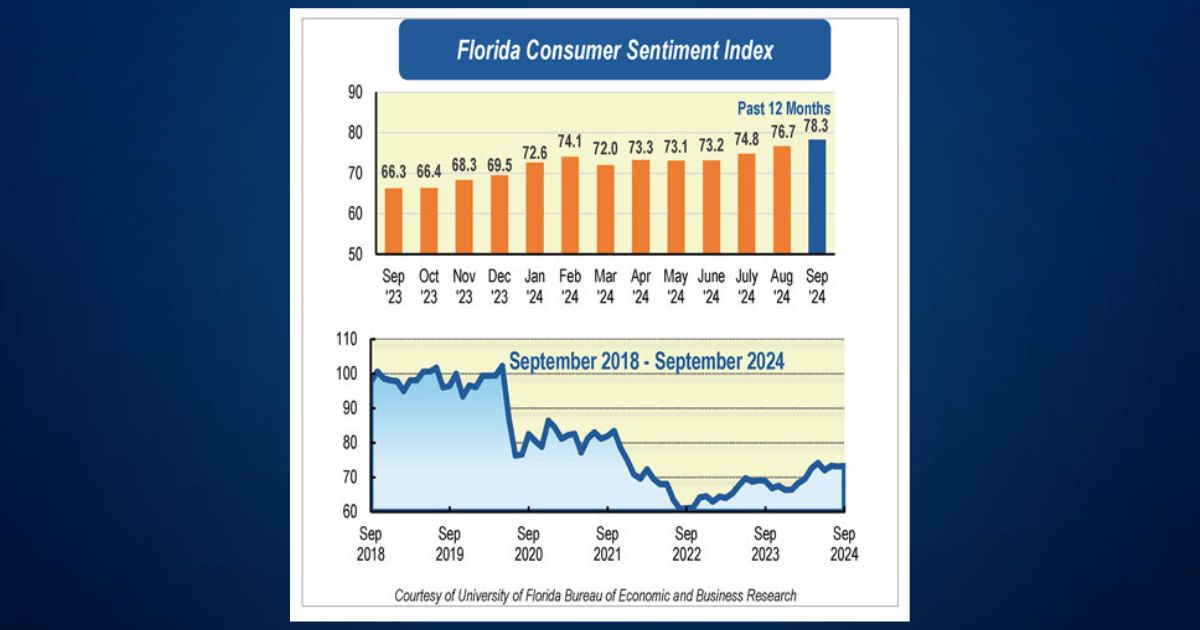Data from a recent survey conducted by the University of Florida (UF) shows an improving economic outlook for consumers.
According to UF’s Bureau of Economic and Business Research, consumer sentiment among Floridians rose for the fourth consecutive month in September to 78.3 points, up 1.6 points from a revised figure of 76.7 in August. At the same time, national consumer sentiment also rose over 2 points for the second straight month.
“The decrease in interest rates should boost discretionary spending, encourage business expansion through increased investment and hiring, and further enhance confidence among Floridians,” said Hector Sandoval, Director of UF’s Economic Analysis Program.
Conducted August 1 to September 29, the UF study reflects the responses of 254 individuals who were reached on cellphones and 296 individuals reached through an online panel, a total of 550 individuals, representing a demographic cross section of Florida. The index used by UF researchers is benchmarked to 1966, which means a value of 100 represents the same level of confidence for that year. The lowest index possible is a 2, the highest is 150.
“Floridians’ increasing optimism was primarily driven by their positive views on the nation’s economy over the next year, reflecting the current economic trends,” UF’s Consumer Sentiment report reads. “Although overall price levels won’t return to where they were a couple of years ago, annual inflation continued to decline, with the Consumer Price Index (CPI) falling to 2.5% and the Personal Consumption Expenditure (PCE) Price Index— the Fed’s preferred measure—dropping to 2.2% in August. Moreover, while the labor market has cooled, it remains stable, with the U.S. unemployment rate slightly declining to 4.2% and Florida’s rate holding at 3.3% in August, both at historically low levels. Considering the progress on inflation, the Federal Reserve announced a 0.5 percentage point cut in interest rates in mid-September, which will ripple through the economy, reducing borrowing costs for consumers and businesses.”
According to the report, four of the five components that make up the index increased, while one decreased.
Floridians’ opinions about current economic conditions were mixed. Opinions of personal financial situations now compared with a year ago decreased 1 point from 59.5 to 58.5. However, these views varied across sociodemographic groups with men and people with an annual income under $50,000 expressing more favorable views. In contrast, opinions as to whether now is a good time to buy a major household item like an appliance rose 1.3 points from 59.6 to 60.9. Again, opinions were divided, but in this case, people 60 and older, as well as people with annual income over $50,000, reported negative views.
The three components related to Floridians’ anticipation about future economic conditions were positive. Expectations of personal finances a year from now increased 1.1 points from 92.6 to 93.7. Outlooks for U.S. economic conditions over the next year saw the largest increase this month, rising 4.4 points from 83.7 to 88.1. These expectations of the national economy are at their highest level in four years. Similarly, expectations of U.S. economic conditions over the next five years rose 2.1 points from 88.3 to 90.4.
Positive trends varied by demographics. Men reported pessimistic views across all three components, while people 60 and older, as well as people with an annual income over $50,000, also expressed negative views regarding their future personal financial situation.
“Looking ahead, we anticipate that consumer confidence will be impacted by the effects of Hurricane Helene in the coming month, likely leading to a decline among Floridians. However, as interest rate cuts begin to ripple through the economy and further reductions are announced later this year, we expect consumer sentiment to improve overall in the months ahead,” Sandoval added. Hurricane Helene made landfall as a Category 4 storm in the Big Bend region on September 27, causing significant property damage and economic losses. “While the full impact on the state’s economy is still being assessed, it is unlikely to have lasting effects on Florida’s overall economy. However, it will affect consumer confidence among Floridians, though such impacts are typically short-lived,” said Sandoval.
Details of this month’s survey can be found at https://www.bebr.ufl.edu/florida-consumer-sentiment/.



















